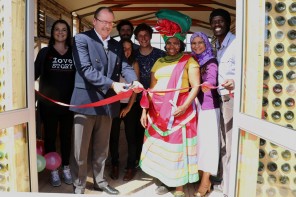WOOLWORTHS INTRODUCES THE FIRST 100% SOUTH AFRICAN ORGANIC COTTON GARMENTS FOR SUMMER 2009
Just five years after introducing South Africa’s first clothing made from 100% organic cotton, Woolworths is proud to announce that they will have the first clothing ever made from local, South African grown organic cotton in stores for Summer 2009.
The first 100% SA Organic range of t-shirts in both womenswear and menswear is being made from South Africa’s first commercial-scale organic cotton crop, which was harvested last year in Limpopo. The planting of these 22 hectares was part of a 2-year long pilot project which involved Woolworths, the Organic Exchange, ComMark, Cotton SA and the Agricultural Research Council’s Institute for Industrial Crops.
The harvest yielded some 30 000 kg of seed cotton, which was then cleaned, processed and spun into yarns. Rotex Fabrics knitted the fabric, which was then made up into t-shirts by long-time Woolworths supplier, Monviso. Every step of the process took place in South Africa, making these t-shirts the first 100% South African, 100% organic cotton garments to be available in this country.
According to the Organic Exchange, conventionally grown cotton consumes approximately 25% of the insecticides and over 10% of the pesticides used in the world. Organic cotton, on the other hand, is produced using only natural compost and pest management techniques,making it much healthier for the environment and safer for farm workers. The growing awareness among consumers of these advantages hassparked a worldwide move towards organic cotton.
What The Experts Say…
“It is very exciting to have the first products made with organic cotton grown in South Africa in the stores at Woolworths South Africa,” says David Bennell, Executive Director of Organic Exchange.
“By linking together the farmer, manufacturer, retailer and the customer who uses the garment, Woolworths South Africa is helping build a more sustainable economy and improve the environment in South Africa.”
“A number of aspects make this project extremely exciting,” says Darren Todd, Woolworths Group Head of Sourcing & Technology. “Not only have we succeeded in producing cotton organically on a commercial scale in South Africa for the very first time, but perhaps even more importantly, we have now established a mechanism for taking fibre from farmer to customer with the help of our supply chain partners. This is truly an outstanding achievement.”
Todd adds, “I am happy to say that we are already well into the next round of production and are pleased to be working with the farmers who have already demonstrated their full commitment to the project – Jacques Willemse of Hanaline Farm in Weipe, Bertus and Rudolph Otto from Secrabe Farm in Vivo, and Flip Nel from Oppie Randjie Farm in Weipe.”
He continues, “This round is on a slightly larger scale and we are constantly reviewing soil quality improvement, crop yields and fibre quality. Important lessons have already been learned about inter-planting and insect management, and we are steadily building a solid foundation to increase organic cotton production locally.
“As part of its Good business journey, Woolworths is committed not only to promoting the use of organic cotton, but also to fostering the growth of a relevant and appropriate local organic cotton industry,” says Todd.
“Our goal is to help South Africa’s cotton sector align itself with international concerns around addressing climate change, and at the same time open up possibilities for South Africa’s small-scale farmers. In time, we could just change the face of our cotton industry for the better.”
ComMark, too, believes that the project will have long-term benefits for cotton production in South Africa. “Developing integrated organic cotton products – grown, processed, manufactured and marketed in South Africa – could have a catalytic effect on both the agribusiness and clothing & textile sectors,” says ComMark’s Executive Director, Stephen Hanival.
He adds, “In addition, increased incorporation of small-scale farmers in innovative development programmes such as the organic cotton trials in South Africa entrenches new and sustainable agricultural production skills and opens up the space for such farmers to participate in the opportunities created by the rise in demand for food and fibre worldwide.”
Commenting on the project, Hennie Bruwer, CEO of Cotton SA, says, “Cotton SA supports any initiative to increase the intrinsic value of cotton such as the organic cotton project, which at the same time also contributes to the socio economic enhancement of the cotton farming sector in general.”
The liveeco team






